|
|
|
Sort Order |
|
|
|
Items / Page
|
|
|
|
|
|
|
| Srl | Item |
| 1 |
ID:
165588
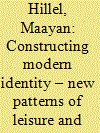

|
|
|
|
|
| Summary/Abstract |
This article explores the cultural transformation that unfolded in urban centres in Palestine during the British Mandate period. Focusing on the city of Haifa as a case study, the article sheds light on how imperial colonial interests prompted massive development of the city that triggered significant cultural changes. The article examines the ways in which different groups in Palestinian-Arab society were involved, and how they initiated, experienced and reacted to the cultural shifts. The rapid increase in the number of cafés, cabarets, bars and restaurants constituted the cornerstone of the commercial entertainment industry in Haifa during this period. By delineating the emergence of new entertainment patterns and recreation habits, the article shows how leisure became a central component in the daily lives of varied social groups. It argues that leisure played a major role as an agent of modernisation and functioned as an essential site for the construction of modern personhoods in Palestinian society.
|
|
|
|
|
|
|
|
|
|
|
|
|
|
|
|
| 2 |
ID:
151819


|
|
|
|
|
| Summary/Abstract |
This article examines the gendered digital divide in Israel in the age of the radiophonic cyber-revolution. The research focuses on increased listening patterns to on-demand, radiophonic content via online radio. Recent years have witnessed a shift in the second level of the gendered digital divide. This shift is effectively captured by the notion of ‘can’t’ transforming into a ‘don’t want to be bothered’ mindset. To explore this phenomenon an online survey was conducted on online listeners of a regional radio station. Israel’s top-rated regional station, 103FM-Non-Stop Radio, was selected. The survey was conducted in April 2014. A total of 2013 listeners were surveyed: 1491 men and 522 women. Our results found that for the under 35 years of age listeners increased listening patterns were gender-blind. The same conclusion was reached for other demographic groups: The findings from this group do, in fact, attest to a gendered digital divide. The key demographic groups here are married couples and parents. These trends highlight the continued need for further research into online radio listening patterns and their relationship to gender-related differences in the digital age.
|
|
|
|
|
|
|
|
|
|
|
|
|
|
|
|
| 3 |
ID:
088482
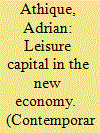

|
|
|
|
|
| Publication |
2009.
|
| Summary/Abstract |
The ascendance of the multiplex film theatre in India has great significance in the creation of new public space, and is part and parcel of the long-running contestation of modernity and citizenship in postcolonial India. However, while the histories of urbanism, cinema and modern politics are usefully indicative of each other, their relationship in this instance also needs to be further related to the history of leisure capital in India and, in particular, to the contemporary dynamics of the media economy. The rise of the multiplex is closely related to the re-organisation of working practices and of capital investment within the film exhibition sector. The aggregation of interests within what has traditionally been a highly fragmented industry with largely informal organisation is a result of both the entry of outside concerns into the theatrical market and of operational change within the industry itself as leading players pursue an agenda of 'corporatisation'. It is these new corporate entities, funded by institutional investors and public flotation, that dominate the multiplex business, which has arisen in marked contrast to the loose agglomeration of family-owned theatres that have previously characterised theatrical exhibition in India. As the leading multiplex brands embark upon a massive programme of expansion into India's second-tier cities, this paper provides a critical account of the emerging political economy of the multiplex paradigm.
|
|
|
|
|
|
|
|
|
|
|
|
|
|
|
|
| 4 |
ID:
144682
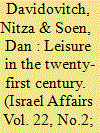

|
|
|
|
|
| Summary/Abstract |
The article deals with the concept of leisure in Israel in terms of time, activity, state of mind, and values. The purpose is to examine changes in how leisure has been conceived in Israel during its 65 years of existence. Which factors have shaped concepts of leisure and styles of leisure in Israel, a country with cultural foundations in both tradition and modernity, and one that encompasses a social culture consisting of new and veteran immigrants, minorities, religious and secular populations? The article examines Israel’s culture of leisure and its transformations. It may have practical implications for the educational challenge of imparting leisure behaviours, promoting understanding and tolerance of those different than us – and possibly even imparting ideal leisure practices.
|
|
|
|
|
|
|
|
|
|
|
|
|
|
|
|
| 5 |
ID:
103135
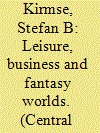

|
|
|
|
|
| Publication |
2009.
|
| Summary/Abstract |
This article explores the participation of university students in non-governmental organizations (NGOs) and other forms of association in the city of Osh, Kyrgyzstan. While the literature tends to criticize donor interventions in the post-Soviet space, an analysis of donor-funded youth projects calls for a more differentiated evaluation. It is argued that youth-oriented associations appeal to the students of Osh because these associations have created much needed 'youth spaces'. In some cases, however, the appeal has little to do with the missions of the projects. Whatever the blueprints prepared by foreign donors, youth-oriented clubs and NGOs provide young people with opportunities for entrepreneurship, for leisure pursuits and for experimenting with their dreams and fantasies. Offering a case study of a group of students who have joined a donor-funded NGO, Students in Free Enterprise (SIFE), the article then charts the students' appropriation of this NGO.
|
|
|
|
|
|
|
|
|
|
|
|
|
|
|
|
| 6 |
ID:
158932
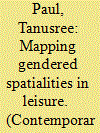

|
|
|
|
|
| Summary/Abstract |
The subject of ‘leisure’, although extensively studied by scholars of multiple disciplines, has often lacked systematic theorization, so far as gendered spatialities are concerned. This paper attempts to address this gap by exploring how space and place relate to gendered leisure practices. Based on a primary survey in the city of Kolkata, India, this paper explores both the place-specific conditions and the person-specific experiences of leisure in the context of new consumption spaces (NCSs). The paper observes that, although these spaces have provided women with new ‘freedom’ to stroll around in public spaces by providing ‘safe’ and ‘civil’ environs, one should refrain from an unproblematic interpretation of this freedom. This is because the usual constraints on women’s leisure continue to apply, even as they ‘freely’ engage with NCSs to spend their leisure time. Local cultural specificities get invested within these ‘global’ spaces and continue to define the ‘appropriateness’ of place, time, and company for women to be enjoying their leisure in their own right. Thus, these spaces actively participate in the reproduction of existential gendered realities and lived experiences, albeit tacitly.
|
|
|
|
|
|
|
|
|
|
|
|
|
|
|
|
| 7 |
ID:
101302
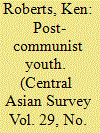

|
|
|
|
|
| Publication |
2010.
|
| Summary/Abstract |
This article argues that Central Asian youth share more commonalities than differences vis-agrave-vis young people in other ex-Communist countries. The common features include high rates of unemployment and under-employment, associated poverty and a propensity to become pendulum migrants. Meanwhile, as elsewhere, rates of participation in higher education have risen spectacularly in parts of Central Asia. Central Asia has been part of a global trend towards later marriages and lower rates of fertility, although the region's young people still tend to marry earlier and parent more children than in other parts of the ex-USSR. As elsewhere, Central Asian youth have lost most of the provisions for leisure activities formerly offered by state and Communist Party organizations. These have been replaced by relatively patchy provisions by NGOs, and commercial facilities that are beyond the means of most young people. The article argues that the most distinctive feature of youth in Central Asia is citizenship in newly independent states with no prior history of statehood, hence their difficulties in achieving a collective identity. This has created a metaphorical market place in identities. What young people share with youth throughout East-Central Europe and Eurasia is a dominant personal aspiration; namely, to join their countries' new middle classes.
|
|
|
|
|
|
|
|
|
|
|
|
|
|
|
|
| 8 |
ID:
124531
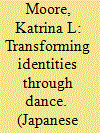

|
|
|
|
|
| Publication |
2013.
|
| Summary/Abstract |
While the performance of its celebrated actors is often in the limelight, an equally important, but often unremarked, element of the Noh world is the many amateur performers who engage in the practice as a leisure activity. This article explores the shifts in identity that women say occur through Noh practice. I examine the 'states of being' that arise through these performances, and explore how women say Noh practice contributes to their life course development. Drawing on ethnographic research, I examine how the process of learning Noh intertwines with the everyday lives of women amateurs, and how the rigours and pleasures of learning Noh take on a particular significance as women grow older.
|
|
|
|
|
|
|
|
|
|
|
|
|
|
|
|
| 9 |
ID:
159995
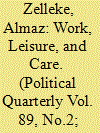

|
|
|
|
|
| Summary/Abstract |
In ‘The case for a participation income’, Anthony Atkinson identified unconditionality as an obstacle to support for a citizen's income. He advocated prioritising the universality and individuality of a citizen's income but replacing its unconditionality with a ‘participation’ requirement. At the time, Atkinson's critique read as political realism: to eliminate means‐testing, make a concession to the fear of free‐riding. Ironically, Atkinson remained opposed to unconditionality despite his own critical contributions to documenting the growing income and wealth inequality that have increased support for an unconditional basic income. In this article I consider the ‘participation’ requirement from a gender perspective in order to uncover the problematic notions of ‘dependence’, ‘independence’, reciprocity, and free‐riding that underlie normative arguments for conditional over unconditional benefits. Employing such a perspective demonstrates the superiority of unconditional benefits in achieving more efficient and effective income support and reducing inequality—Atkinson's core commitments throughout his distinguished career.
|
|
|
|
|
|
|
|
|
|
|
|
|
|
|
|
|
|
|
|
|